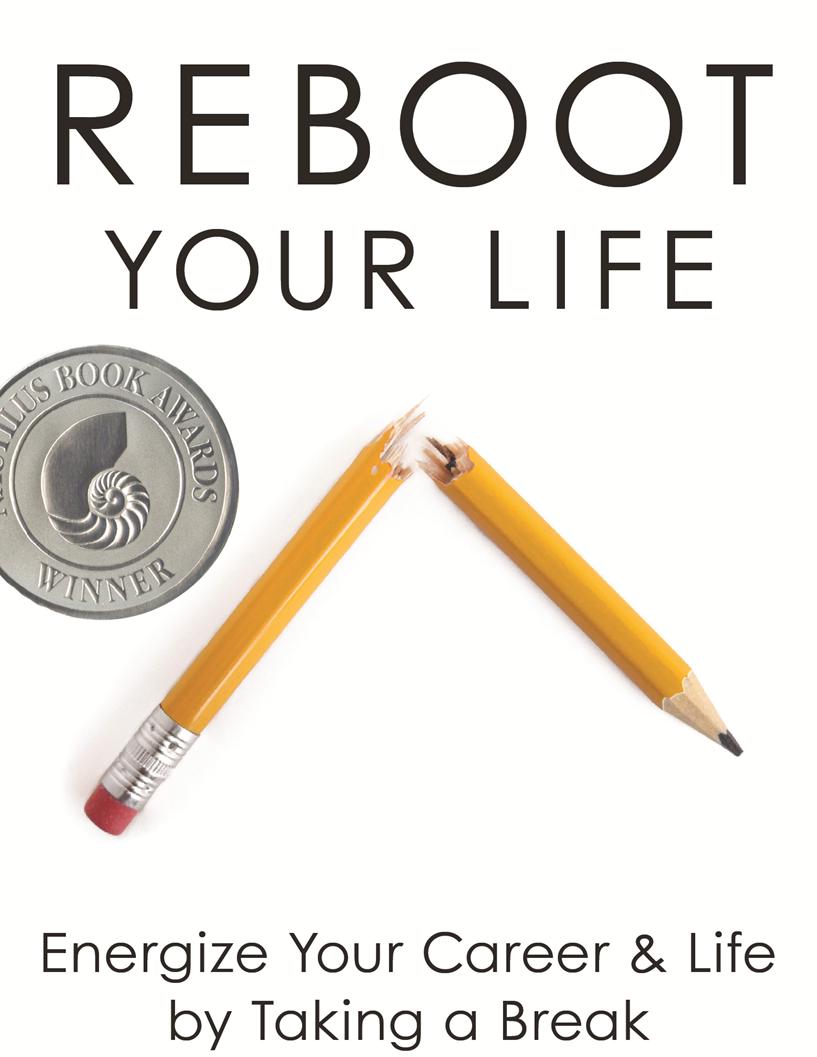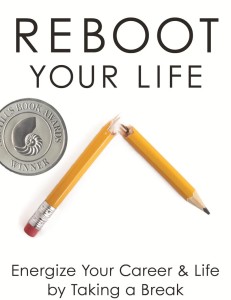
 Live in the lounge is Reboot Your Life author, Catherine Allen. She opens up about how the Reboot Your Life book came together, the secret sauce behind making a partnership work between four co-authors and why people are motivated to quit their jobs to start a business.
Live in the lounge is Reboot Your Life author, Catherine Allen. She opens up about how the Reboot Your Life book came together, the secret sauce behind making a partnership work between four co-authors and why people are motivated to quit their jobs to start a business.Reboot Your Life was awarded a 2012 Nautilus Book Award, joining the ranks of other accomplished authors such as Deepak Chopra, Barbara Kingsolver, Eckhart Tolle, Christiane Northrup, Julia Cameron, and Gary Zukav. You can follow Reboot Your Life on Facebook, Twitter and website.
The book is the result of a co-authoring effort between four women (The Sabbatical Sisters, see photo ) who met at an event where you had to pick a table whose topic was of interest to you. We all landed at the table “Follow Your Dreamsâ€. Each of us has a professional background and through our discussion discovered we had all taken, or wanted to take, some type of bigger break from regular work for various reasons. One year later, same event, we continued the conversation and decided that even Type-A personalities like ourselves need time to renew and refresh before heading into a new phase of life, either professionally or personally. Our own experiences had shown us firsthand the benefits of that process so we decided to put some meat behind it and write a book. We didn’t even know each other that well! We simply shared a passion for the topic.
We interviewed about 300 people and over 50 companies with the intent to uncover any correlation between taking time off and creativity and innovation. Our goal included identifying tools that would help people through the process and create a roadmap to having a successful break. We have already begun our second book since our first one, along with the retreats we host every year, have shown us that there are unique circumstances for those heading into retirement. It’s a different type of break altogether because of the phase of life in which it occurs, different than a sabbatical when we are younger.
 Any big ahas’ about entrepreneurs - those who quit their jobs to pursue launching a new business?
Any big ahas’ about entrepreneurs - those who quit their jobs to pursue launching a new business?The people we interviewed were often considering a break in search of less structure, creating a space with a pace and environment that was self-determined. Individuals were also asking themselves “how can I turn my passion into a business?â€. Three guiding lights emerged in this part of the research: 1) People want to give back in some way, whether through non-profit or social capitalism pursuits 2) Interested in employing and mentoring others 3) Not wanting to answer to someone, other than the board or customers, and experience the freedom to test their capabilities. These were consistent traits in all age groups and genders.
Separate from the research, as a baby boomer and entrepreneur myself, I have seen firsthand the change in the way women are thinking about starting businesses today. It used to be a spot only for men and if a woman was starting her own business it was small. She wasn’t even thinking in terms of scalability. Today, there appears to be way more momentum with women as entrepreneurs and having the support they need to think big.
Women tend to be multi-taskers, they can segment their lives into work, girlfriends, home and they are actually a little more holistic in their approach to life. Men tend to be work or sports-oriented, it’s harder for them to give up the “I am ___†and I am what I do. This difference results in the men, and often the Type A personality women, feeling lost during the “between gigs†phase of taking a break. They don’t know how to define themselves. The result is that convincing men to take time off or even come to a retreat is difficult. But when they attend, or when they do take a break, it is amazing how quickly they adapt, getting really engaged. They just need the support. Women, being generally accustomed to juggling, transition more smoothly in and out of the sabbatical phases.
We keep in touch with many of the people we interviewed, particularly through the retreats we hold throughout the year, and mostly, the outcomes are very positive. It’s incredible how people transform when they take time to focus on their passions and themselves. There is one story about a man who quit his job to start a business and it did not turn out great, at least on the business side. He had always wanted to own and run a bed and breakfast and that’s exactly what he did. Unfortunately, he did it in 2008 and it’s no surprise that things did not turn out well financially. Taking a break to launch a business includes many criteria for success, not only about the individual. He did return to the corporate world but he enjoyed the experience, learned from it, and is mapping out his next endeavour.
I knew early on, when I was still in the corporate and academic worlds, that I would want my own business someday. I had a nagging passion for it. Over the years, I focused on creating a name for myself in the emerging technologies space with a reputation for seeing things that other people don’t on the horizon. My intent was to clearly tie my name to that body of work and when I started the Santa Fe Group, the result was that clients were seeking me out because my brand in that space was well-known. So my advice? Have a passion and be a thought leader in it. Establish your integrity and show yourself to be trustworthy to any customer, whatever your business. Lastly, know how to pull together a team and manage people, because you cannot possibly be good at everything. I’m not great at finances, although I force myself to do it. As soon as I could hire someone, I brought in a COO with opposite skills to my own, whom I totally trust, and that has been a key element in my success.
How they expanded Reboot Your Life beyond the book: The four of us created Reboot Partners LLC, which includes our retreats, books, website and the consulting work we’re doing for corporations and governments to build out their sabbatical program. Through our work, we’ve also identified a need to help companies and individuals plan for the transition to retirement, which is not about the financial side it’s about the time and what to do with it. We all have other jobs or commitments, yet the four of us, along with a few part-time employees are passionate about this work and have been successful carving out time for it.
Staying connected and organized: We make decisions together and various tasks and responsibilities are doled out amongst the team. We all help each other, yet, it’s very clear who is delivering what. We live across the United States, two are in NYC, one in Washington, and myself in Santa Fe. We mostly use emails and conference calls to communicate leveraging tools like Basecamp and Dropbox to share files. We meet in person on a regular basis which we build in around our retreats.
The secret sauce behind their successful partnership: I believe that one of the big contributors to our success has been the clarity of what each of us brings to the table. Our partnership began with a discussion about our strengths and weaknesses and we assigned each one of us to those areas where the individual excels. Grabbing that bottle of wine and having a heartfelt discussion not only about what you’re good at, but also about what you like and don’t like to do has resulted in pointing our energy in the optimal direction. We have partnership and exit contracts, it’s incredibly important to us that the way we work together is clearly laid out and we can still be good friends no matter what happens. It’s ok to say you might exit, life changes on a dime. And no one wants to get screwed. Everyone’s path is different and you never know when one person will want to explore something else and having those contracts creates a foundation of confidence for the partnership.
Thank you to Catherine for sharing your story and insight! You can learn more about her, the co-authors and the Reboot Your Life book here at Rebootbreak.com